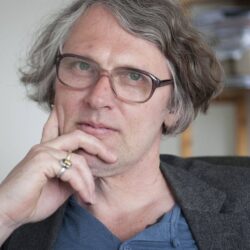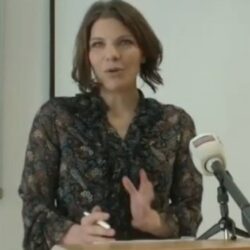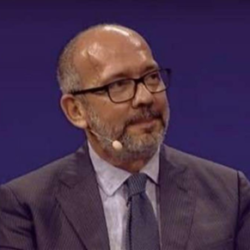
Presentó su trabajo de habilitación en la Bergische Universität Wuppertal en el año 2000, donde previamente se doctoró con una disertación summa cum laude titulada “Grundstimmung. Martin Heideggers Phänomenologie der Welt”, dirigida inicialmente por el Prof. Dr. Klaus Held. Obtuvo la beca de doctorado de la Studienstiftung des deutschen Volkes. Estudió filosofía, musicología e historia del arte en la Ruhr-Universität Bochum. Fue becario de la Ernst-Jünger-Stipendium del estado de Baden-Württemberg, otorgada por el Deutschen Literaturarchiv Marbach am Neckar. También fue becario posdoctoral del DFG-Graduiertenkolleg (Wuppertal-Bochum) ‘Phänomenologie und Hermeneutik’ con estancia de dos meses en la Universidad de Kyoto (Japón) mediante una beca de la Sociedad Japonesa para la Promoción de la Ciencia; asimismo fue nombrado profesor asociado de filosofía en el departamento A de la Bergische Universität Wuppertal.
Algunas de sus publicaciones son:
- Das Kapital der Musen: Eros und Aura im Widerschein der Kunst (Wuppertal, Karl Alber, 2025)
- Aschenplätze – Eine Theorie dieses Subjekts (Berlin, Matthes & Seitz Berlin, 2024)
- Frei: Zwei Gespräche (Frankfurt, Vittorio Klostermann, 2023)
- Hitler, die Philosophie und der Hass (Berlin, Matthes & Seitz Berlin, 2021)
- Der Verlust der Kette. Anmerkungen zur Apokalypse (En: Dritte Natur. Bd. II. Hrsg. von Steffen Richter und Andreas Rötzer. Matthes & Seitz: Berlin 2019)
- Die Geisel des Kapitals — Zu Charles Peguys „Das Geld“. Nachwort von Charles Peguys ( En: Das Geld. Matthes & Seitz: Berlin 2017, pp, 117-129)
- Heidegger and the Shoah (En: Reading Heidegger’s Black Notebooks 1931-1941. Hrsg. von Inge Farin und Jeff Malpas. The MIT Press: Cambridge, Massachusetts and London, England 2016, pp, 169-180)
- Intimacy and „Abyss“ in Hölderlin’s „Death of Empedocles“ (En: Dis-orientations. Philosophy, Literature and the Lost Grounds of Modernity. Ed. by Marcia Sá Cavalcante Schuback. Rowman & Littlefield: London 2015, pp, 234-249)
- Europa und die Revolution. Tumult (En: Zeitschrift für Verkehrswissenschaft. Hrsg von Franz Böckelmann und Walter Seitter. Frühjahr 2014, pp, 11-17)
- Artikel »Martin Heidegger« (En: Ernst Jünger-Handbuch. Hrsg. von Matthias Schöning. J.B. Metzler Verlag: Stuttgart u. Weimar 2014, 368-371 Heidegger et les Cahiers noirs. In: Esprit. No. 407. August-September 2014, pp, 133-148)
- Eschatologische Kulturkritik. Nebels Essay „Stefan George und die entgötterte Welt“ (En: Gerhard Nebel. „Ein gewaltiger Verhöhner des Zeitgeistes“. Hrsg. von François Poncet. Wilhem Fink Verlag: München 2013, pp, 81-92)
- La revolución en el pensamiento político de Hannah Arendt (En: Reflexiones en filosofía contemporánea. Edición de Alfredo Rocha de la Torre. Grama Ediciones: Buenos Aires 2013, pp, 37-52)
- Artikel »Martin Heidegger« (En: Die deutsche Philosophie im 20. Jahrhundert. Ein Autorenhandbuch. Hrsg. von Thomas Bedorf und Andreas Gelhard. WBG: Darmstadt 2013, pp, 137-145)
- Über die ontologische Differenz in der Kunst. Ein Rekonstruktionsversuch der »Überwindung der Aesthetik« bei Martin Heidegger (En: Heidegger Studies. Volume 10. 1994, pp, 207-221)
- Das Gedicht auf dem Weg in die Fremde. Eine Notiz zu der Elegie »Der Wanderer« bei Friedrich Matthisson. (En: Hölderlin Jahrbuch 1994-1995. Bd. 29, pp, 276-282)
- Von der Liebe. Anmerkungen zu einer poetischen Phänomenologie bei Rainer Maria Rilke (En: Phänomenologische Forschungen. Neue Folge 1.-2. Halbband. 1996, pp, 221-238)
- O Kraju Umetnosti v Mišljenju Martina Heideggra. (Zum Ort der Kunst im Denken Martin Heideggers.) (En: Phainomena 21-22. Krog Razumenvanja. Ljubljana 1996, pp, 59-79)
- George dichtet Nietzsche. Überlegungen zur Nietzsche-Rezeption Stefan Georges und seines Kreises. (En: George-Jahrbuch. Bd. 3. 2000, pp, 34-68)
- The Future of Time: Reflections on the conception of Time in Hegel and Heidegger. (En: Research in Phenomenology. Vol. XXX. Hrsg. von John Sallis. 2000, pp, 12-39)
- Der kommende und der letzte Gott bei Hölderlin und Heidegger. »Voll Verdienst, doch dichterisch wohnet / Der Mensch auf dieser Erde.« Heidegger und Hölderlin (En: Martin-Heidegger Schriftenreihe. Bd. 6. Hrsg. von Peter Trawny. Frankfurt am Main 2000, pp, 199-220)
- Die unscheinbare Differenz. Heideggers Grundlegung einer Ethik der Sprache (En: Phénoménologie française et phénoménologie allemande. Hrsg. von Eliane Escoubas et Bernhard Waldenfels. Paris 2000, pp, 65-102)
- Die Tragödie der Philosophie. Platons Streit mit den Dichtern (En: Denkwege 2. Philosophische Aufsätze. Tübingen 2001, pp, 106-128.)
En 2012 participó en la fundación del primer Instituto Martin Heidegger en la Bergische Universität Wuppertal (Alemania) y desde 2015 es responsable de la planificación del programa filosófico de la prestigiosa Vittorio Klostermann Verlag. Ha sido editor de doce tomos de la Gesamtausgabe entre los que figuran los célebres “Cuadernos Negros” de Martín Heidegger.








